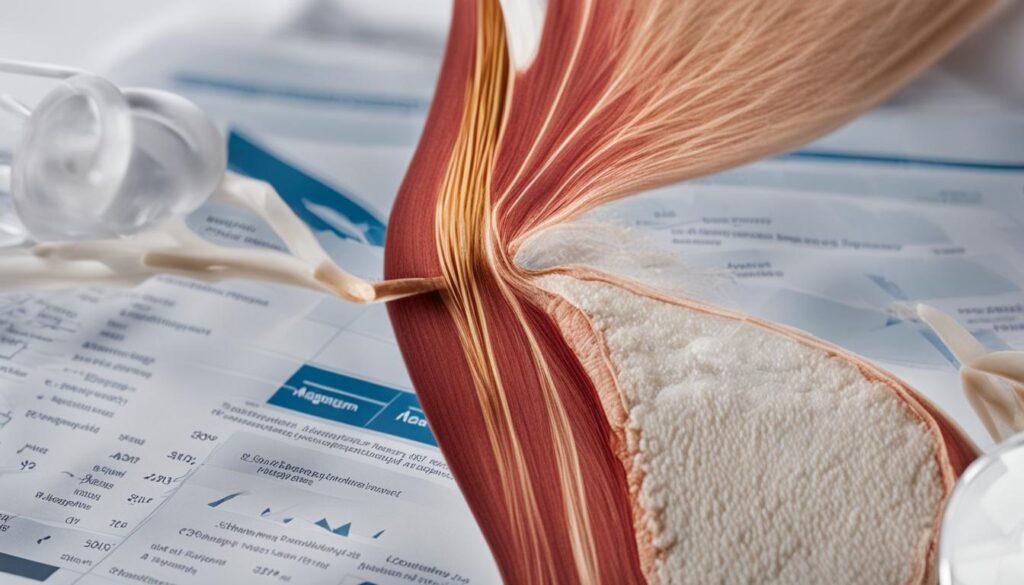Leg cramps can be a common and troublesome issue, affecting up to 60% of adults and 7% of children. They can cause severe pain and sleep disturbance, and some individuals experience residual pain after cramping. While quinine was once a common treatment for leg cramps, it has been discontinued due to safety concerns. Magnesium supplements have been suggested as a potential remedy, as magnesium plays a role in muscle contraction. However, current evidence only supports the use of magnesium supplements for pregnancy-related leg cramps. There is limited research supporting the effectiveness of magnesium supplements for general leg cramps in the general population.
Key Takeaways:
- Magnesium supplements may be effective for relieving pregnancy-related leg cramps.
- Research on the effectiveness of magnesium supplements for general leg cramps is limited.
- Other treatment options, such as stretching exercises and medications, may be considered for managing leg cramps.
- Consultation with a healthcare professional is recommended for individual cases of leg cramps.
The Role of Magnesium in Leg Cramps
Magnesium deficiency has been proposed as a possible cause of muscle cramps, including leg cramps. Magnesium plays a critical role in muscle contraction and neuromuscular transmission, which has led to the hypothesis that magnesium deficiency may contribute to muscle cramps. While the evidence supporting this link is limited, magnesium supplementation has shown effectiveness in certain conditions such as eclampsia, pre-eclampsia, arrhythmia, severe asthma, and migraine.

There is also some evidence suggesting that magnesium supplementation may be beneficial for pregnant women experiencing leg cramps. During pregnancy, the demand for magnesium increases, and deficiencies may occur more frequently. However, the overall effectiveness of magnesium supplements for general leg cramps in the larger population is inconclusive.
In conclusion, while there is a proposed connection between magnesium deficiency and muscle cramps, the evidence supporting the use of magnesium supplements for leg cramps is limited. More research is needed to determine the true extent of magnesium’s impact on muscle cramps, particularly in non-pregnancy-related cases. Other treatment options, such as non-pharmacological interventions and alternative medications, may be explored as well.
The Evidence on Magnesium Supplements for Leg Cramps
Multiple clinical studies and systematic reviews have examined the effectiveness of magnesium supplements for leg cramps. One recent systematic review found that the overall effect of magnesium supplementation on nocturnal leg cramps was insignificant. While a sub-analysis of pregnant women showed a significant difference in the number of leg cramps experienced per week, the studies included were small and underpowered. Another systematic review found small and non-statistically significant differences in cramp frequency between magnesium and placebo groups in studies involving older patients and women with pregnancy-related leg cramps. The overall conclusion from these reviews is that magnesium is unlikely to provide significant benefits for idiopathic leg cramps in older people.
| Study | Population | Findings |
|---|---|---|
| Clinical Study 1 | Pregnant women | Significant reduction in leg cramps with magnesium supplementation |
| Clinical Study 2 | Older patients and women with pregnancy-related leg cramps | No significant difference in cramp frequency between magnesium and placebo groups |
While these findings suggest that magnesium supplements may have some benefits for specific populations, further research is needed to fully understand the efficacy of magnesium for leg cramps in different groups. It is important to consider individual factors and consult with a healthcare professional before starting any supplement regimen.
Systematic Reviews on Magnesium Supplementation
Systematic reviews provide valuable insights by analyzing multiple studies on a specific topic. In the case of magnesium supplementation for leg cramps, systematic reviews have shown mixed results. Some reviews suggest that magnesium may have a limited impact on leg cramps, while others report inconclusive findings. One key factor contributing to the variability in results is the variation in study design, population, and dosage of magnesium supplements used.
In conclusion, while magnesium is unlikely to provide significant benefits for idiopathic leg cramps in older people, it may have some effectiveness in reducing leg cramps in pregnant women. Additional high-quality clinical studies are needed to establish the true efficacy and optimal dosage of magnesium supplementation for leg cramps in different populations.

Note: The image above illustrates the ongoing research and clinical studies on magnesium supplements for leg cramps.
Other Treatment Options for Leg Cramps
Aside from magnesium supplements, there are various other treatment options available for leg cramps. These include non-pharmacological interventions, stretching exercises, medications, and alternative remedies.
Non-Pharmacological Interventions
Non-pharmacological interventions, such as stretching exercises, can help relieve and prevent leg cramps. Passive stretch and massage of the affected muscle have been reported to provide relief, although there is no clinical trial evidence to support their effectiveness. Engaging in regular stretching exercises, particularly for the calf muscles, can also help prevent leg cramps.
Medications
Some medications have shown potential benefits in relieving leg cramps. Diltiazem, a calcium channel blocker, gabapentin, an anticonvulsant, and vitamin B complex have demonstrated positive results in smaller studies. However, the overall quality of evidence is poor, and further research is needed to establish their effectiveness and safety in managing leg cramps.
Alternative Remedies
Various alternative remedies have been suggested for leg cramps, although their efficacy has not been extensively studied. These include multivitamins, sodium supplementation, and calcium supplements. However, there is a lack of controlled trials to support their use as alternative treatments for leg cramps. Paracetamol may also help manage residual muscle pain after cramping, providing temporary relief.
Incorporating these non-pharmacological interventions, stretching exercises, and considering alternative remedies and medications under medical supervision can help individuals find a personalized approach to managing leg cramps.
Conclusion
In conclusion, the available evidence suggests that the effectiveness of magnesium supplements in relieving leg cramps is limited. While magnesium deficiency has been considered as a potential contributor to muscle cramps, the overall efficacy of magnesium supplementation for general leg cramps remains inconclusive.
Although there is some support for the use of magnesium supplements in pregnancy-related leg cramps, more research is needed to establish their benefits for other types of leg cramps. It is important to note that individual responses to magnesium supplementation may vary.
For individuals seeking alternative options to manage leg cramps, non-pharmacological interventions such as stretching exercises can provide relief. Additionally, consulting with a healthcare professional is recommended to explore other potentially effective medications or remedies based on an individual’s specific circumstances.
Overall, while magnesium supplements may hold promise for certain cases, further research is required to ascertain their effectiveness for leg cramps. As with any health concern, it is crucial to consult with a healthcare professional for personalized advice and guidance.
FAQ
How do magnesium supplements affect leg cramps?
The effectiveness of magnesium supplements for leg cramps is inconclusive, with limited evidence supporting their use. While they may provide some benefits for pregnancy-related leg cramps, more research is needed to determine their overall effectiveness.
What are the benefits of magnesium supplements for leg cramps?
The benefits of magnesium supplements for leg cramps are uncertain. While magnesium deficiency has been proposed as a potential cause of leg cramps, the evidence supporting this link is limited. Some studies suggest that magnesium supplementation may help relieve leg cramps in pregnant women, but further research is needed.
How do magnesium supplements help with leg cramps?
Magnesium plays a role in neuromuscular transmission and muscle contraction, leading to the hypothesis that magnesium deficiency may contribute to leg cramps. However, the evidence supporting the link between magnesium supplementation and leg cramp relief is inconclusive.
Can magnesium supplements be used to relieve leg cramps?
While magnesium supplements have been suggested as a remedy for leg cramps, the current evidence is limited. Some studies suggest that magnesium supplementation may provide relief for leg cramps in pregnant women, but more research is needed to determine their overall effectiveness.
Are there natural remedies for leg cramps using magnesium supplements?
Magnesium supplements have been proposed as a natural remedy for leg cramps. However, the evidence supporting their effectiveness is limited. It is recommended to consult with a healthcare professional for advice on managing leg cramps.
What is the effectiveness of magnesium supplements on leg cramps?
The overall effectiveness of magnesium supplements on leg cramps is inconclusive. While some studies suggest that magnesium supplementation may help relieve leg cramps in pregnant women, the evidence for general leg cramps in the general population is limited.
How can leg cramps be managed with magnesium supplementation?
Magnesium supplementation may be one option for managing leg cramps, particularly in pregnant women. However, it is important to consult with a healthcare professional to determine the best course of action based on individual circumstances.





